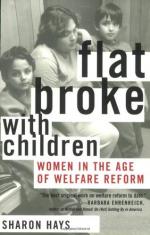|
This section contains 4,870 words (approx. 17 pages at 300 words per page) |

|
Eight years after the passage of the Personal Responsibility and Work Opportunity Reconciliation Act (PRWORA; PL 104-193), welfare reform remained a hotly debated topic. In April 2003 the U.S. Department of Health and Human Services (HHS) issued its fifth annual Temporary Assistance for Needy Families (TANF) report to Congress. The report showed that welfare reform has caused major changes in welfare caseloads and expenditures, but noted that some aspects of the reforms have had adverse effects on child well-being, family income, and marriages.
A new aspect of welfare reform, initiated in 2002, is the development of programs to promote marriage among unwed parents and to advocate "responsible fatherhood." This initiative is based on the findings in numerous studies that married-couple households do better economically, and that children of married-couple households seem to enjoy better health, education, and...
|
This section contains 4,870 words (approx. 17 pages at 300 words per page) |

|


